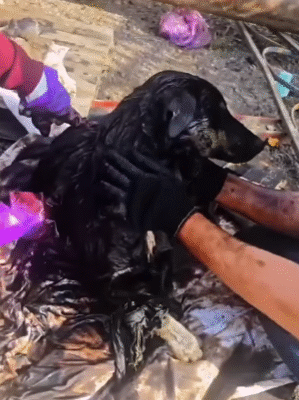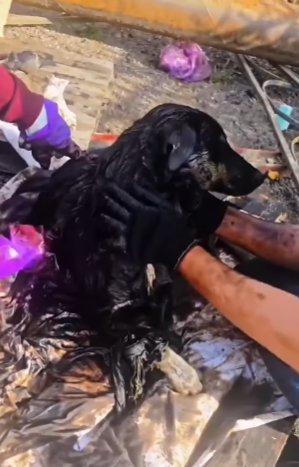
The night had fallen thick and heavy over the industrial outskirts of the city. The streetlights cast long, trembling shadows across the cracked asphalt, barely illuminating the abandoned warehouses and rusting machinery that lined the old road. Rain had started earlier, slicking the streets with a thin, oily film. The air smelled of wet concrete and chemical residue, and in the silence, every drop of water seemed amplified, echoing off the walls.
He hadn’t meant to be there. But tonight, like so many nights before, desperation had driven him beyond reason. Thomas had always considered himself careful, rational—a man who weighed consequences before every step. But life had a way of pushing him into corners he never wanted to explore. He had debts that couldn’t be repaid, threats that couldn’t be ignored, and a sense of guilt that weighed heavier with each passing day. Tonight, he had tried to escape it all, wandering into the forgotten industrial zone, hoping the shadows could swallow him whole.
The tar pit looked like a small, innocuous puddle at first, a patch of black gloss glinting under the dim light. But it was more than that. A hidden pit of industrial tar, left over from old construction projects, lurking beneath a thin film of water and debris. Thomas stepped forward cautiously, not noticing the subtle heat rising from the black surface, not seeing the way the ground gave way beneath his foot. In an instant, he sank.
Panic surged. His legs and torso disappeared into the sticky, viscous tar, pulling him down with a strength that seemed unnatural, inhuman. He clawed at the edges, mud-streaked hands scraping uselessly against the slick surface. Only his head remained above the tar, his dark hair matted, his face glistening with a mixture of sweat and pitch. His eyes, wide and terrified, scanned the shadows desperately, begging for someone—anyone—to notice.
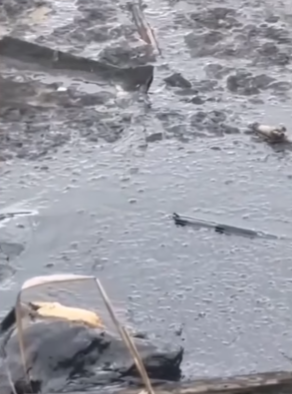
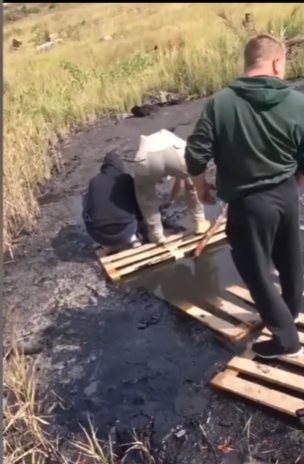
The rain fell harder, beating down on him, mixing with the tar on his face. Every breath was a struggle; the thick black substance clung to his chin and chest, weighing him down. He felt the tar tug at his shoulders, his arms, pulling him inch by inch closer to total engulfment. And in that moment, terror stripped him bare—not just physically, but emotionally. He had never felt so powerless, so completely at the mercy of fate. His mind raced, memories flashing in fragments: his mother’s stern warning about walking near the old factory, the laughter of his daughter over breakfast last week, promises he couldn’t keep.
“Help… please…” His voice barely carried over the rain, a hoarse whisper swallowed immediately by the storm. The darkness seemed to mock him, stretching endlessly, offering no aid, no solace.
Then, in the corner of his blurred vision, movement—a figure emerging from the mist, lit dimly by the flickering glow of a distant streetlight. A man, or perhaps a shadow of one, ran toward him, boots splashing through the puddles, a rope coiled over his shoulder. Thomas’s heart surged. Relief and fear collided in a chaotic storm of adrenaline. Could this be real? Or was it another trick of his imagination, a cruel mirage born of exhaustion and panic?
The stranger reached the edge of the tar pit, eyes scanning quickly, assessing the danger. “Hold on! Don’t move!” the man shouted, his voice cutting through the rain. He secured the rope around a rusted beam, then threw the other end toward Thomas.
Thomas’s hands shook uncontrollably as he grabbed it. The tar pulled with all its weight, threatening to drag him under in the next heartbeat. He wrapped the rope around his wrist, trying to anchor himself, but the pitch clung to him like a living thing. “Hurry… please…” he gasped.
The stranger braced, digging his feet into the wet ground, and began to pull. Inch by inch, Thomas’s head rose higher, his chest struggling to break free of the suffocating tar. He could feel the substance clinging to his skin, burning in its intensity, but he clung to the rope with everything he had. Every muscle in his body screamed, but surrender was not an option.
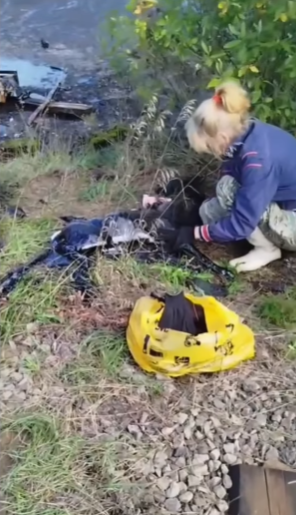
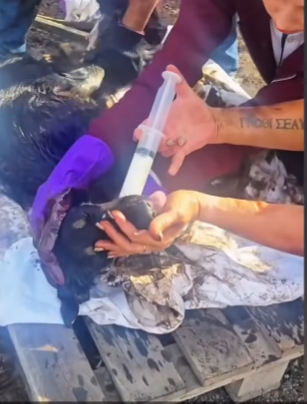
Minutes stretched like hours. Each second was a battle, every movement exhausting. And yet, slowly, miraculously, the tar loosened its grip. Thomas felt the pull of human strength, a tangible lifeline against the darkness that threatened to consume him. With a final, desperate heave, his chest broke free, and he stumbled backward onto solid ground, collapsing in a shivering heap.
The man dropped the rope and knelt beside him. “You’re safe now,” he said firmly, his hands steady despite the chaos around them. Thomas’s eyes, wide and unblinking, locked onto him, silently begging for reassurance. He tried to speak but could only croak, the words swallowed by the storm. The man’s grip on his shoulder was firm, grounding him, pulling him back from the edge of panic.
Hours later, as Thomas sat wrapped in a blanket under the fluorescent lights of a nearby emergency clinic, he could barely comprehend the events. His body ached, coated in tar and bruises, but he was alive. His lungs drew full breaths again without the suffocating pull of the pit. And in his mind lingered the memory of those eyes—his own eyes moments ago, pleading for life, pleading for mercy, pleading for connection.
It was a humbling, harrowing lesson. The pit had taken almost everything, but not his life. And even in the midst of despair, a stranger’s courage and humanity had returned him to the world. Thomas realized that life’s fragility was matched only by the strength of compassion. In the tar, he had been utterly powerless; in the light, he had been saved by someone who saw him not as a mistake or a burden, but as a human being worthy of rescue.
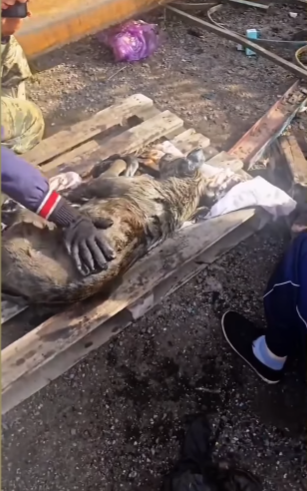
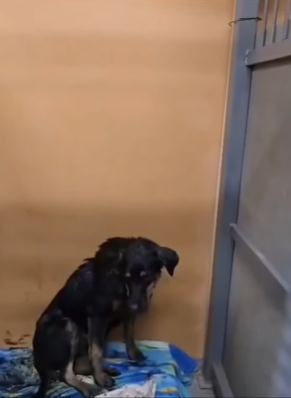
The incident left scars, of course. His body bore the marks of the sticky black tar, and his mind replayed the image of himself half-submerged countless times. But it also left a profound awareness: life could hang by a thread, and in those moments, even the smallest acts of courage could mean the difference between existence and oblivion.
In the weeks that followed, Thomas returned to the site, not out of fascination, but to confront the trauma. He traced the edge of the tar pit, noting the danger it posed to others, and helped local authorities secure the area. He also met the man who had saved him, a quiet, unassuming worker named Minh, who shrugged off Thomas’s gratitude with a modest, “Anyone could have done it.” But Thomas knew better. Minh had chosen action when it mattered most. Minh had made the difference between life and death.
And Thomas, forever changed, carried that lesson forward. He became someone who looked beyond himself, who understood that even in the darkest moments—when only his head remained above the tar, eyes wide and begging for life—hope could arrive in the form of a single hand, reaching from the shadows to pull him back.
Sometimes, at night, Thomas still dreams of the tar pit. But the dreams are different now. They end not in suffocation, but in rescue. Not in despair, but in the vivid, undeniable reality that human connection, courage, and compassion can lift us out of the darkest depths—even when all seems lost.
And every time he closes his eyes, he remembers the sensation of being pulled from the black, viscous abyss, and the truth that stayed with him: that life, no matter how cruelly tested, is never truly over while there are hands willing to reach out for those in need.
